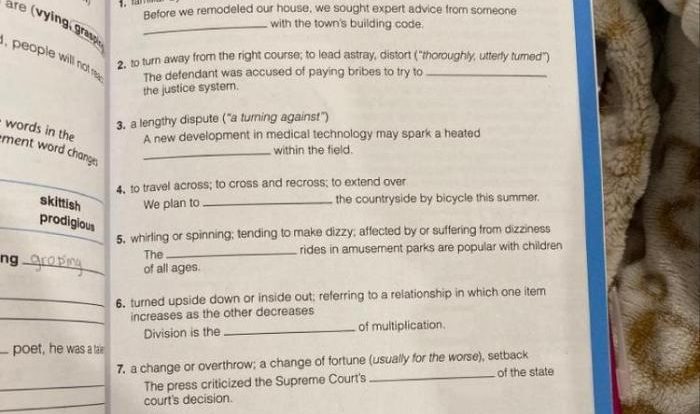Embark on a linguistic adventure with Vocabulary Workshop Level F Unit 4, a comprehensive guide to expanding your vocabulary and unlocking the power of words.
Delve into the art of vocabulary acquisition, discover innovative activities to enhance your learning, and explore the effective assessment techniques that will empower you to master your vocabulary.
Vocabulary Acquisition Strategies
Vocabulary acquisition is a crucial aspect of language learning. It involves learning new words and understanding their meanings. There are various strategies that can be employed to enhance vocabulary, including context, word roots, prefixes, and suffixes.
Context, Vocabulary workshop level f unit 4
Context plays a significant role in vocabulary acquisition. When you encounter a new word in a text or conversation, try to deduce its meaning from the surrounding context. This helps you understand the word’s usage and how it relates to other words in the sentence.
Word Roots, Prefixes, and Suffixes
Many words in English are derived from Latin or Greek roots. Understanding these roots, as well as common prefixes and suffixes, can help you expand your vocabulary. For example, the root “chron” means “time,” so words like “chronology” and “chronic” relate to time.
Prefixes like “re-” (meaning “again”) and suffixes like “-tion” (meaning “action”) can also provide clues to a word’s meaning.
Vocabulary Building Activities
Engaging vocabulary practice is crucial for effective learning. Interactive activities and games make the process enjoyable and reinforce retention.
Organizing Vocabulary Lists
Organizing vocabulary lists thematically or topically enhances understanding and application. Categorizing words based on related concepts, such as synonyms, antonyms, or parts of speech, facilitates recall and deepens comprehension.
Vocabulary Assessment
Assessing vocabulary knowledge is crucial for evaluating students’ progress and identifying areas for improvement. Effective assessment methods can help teachers tailor instruction and provide students with targeted support.
Methods for Assessing Vocabulary Knowledge
There are several methods for assessing vocabulary knowledge, each with its own advantages and disadvantages:
- Multiple-choice questions:These questions present students with a word and multiple possible definitions. Students select the correct definition, demonstrating their understanding of the word’s meaning.
- Fill-in-the-blank exercises:These exercises provide students with a sentence with a missing word. Students must choose the correct word from a list or supply their own, demonstrating their ability to use the word in context.
- Matching exercises:These exercises present students with a list of words and a list of definitions. Students match the words to their correct definitions, demonstrating their understanding of the relationship between words and their meanings.
- Cloze exercises:These exercises provide students with a text with certain words omitted. Students must fill in the missing words, demonstrating their ability to understand the context and choose appropriate words.
- Writing samples:Analyzing students’ writing samples can provide insights into their vocabulary knowledge. Teachers can assess the variety and accuracy of the words students use, as well as their ability to use words effectively in context.
Technology Integration
Technology offers a wealth of opportunities to enhance vocabulary learning. By integrating technology into vocabulary instruction, educators can make learning more engaging, interactive, and accessible.
Online Tools and Resources
Numerous online tools and resources are available for vocabulary building. These include:
- Dictionary and Thesaurus Apps:Apps like Merriam-Webster and Oxford Dictionary provide quick access to definitions, synonyms, and antonyms.
- Online Games and Quizzes:Games such as Wordle and Vocabulary.com offer fun and challenging ways to practice vocabulary.
- Flashcard Apps:Apps like Anki and Quizlet allow students to create and review flashcards on their mobile devices.
- Text-to-Speech Tools:Tools like Natural Reader and TextAloud can help students with pronunciation and fluency.
5. Differentiated
Differentiating vocabulary instruction is crucial to cater to the diverse learning needs of students. By understanding their strengths and weaknesses, teachers can tailor activities and support systems to enhance vocabulary acquisition for all learners.
Supporting Struggling Students
Struggling students may require additional support to grasp new vocabulary. Strategies include:
- Providing visual aids and concrete examples to make concepts more tangible.
- Breaking down complex words into smaller, manageable chunks.
- Using flashcards and games to reinforce vocabulary in a fun and engaging way.
- Offering repeated exposure to new words through various activities.
Challenging Advanced Learners
Advanced learners can benefit from more rigorous vocabulary activities that push their boundaries. Strategies include:
- Introducing sophisticated and nuanced vocabulary that expands their knowledge.
- Encouraging them to explore etymology and word origins to deepen their understanding.
- Assigning projects that require students to create original content using advanced vocabulary.
- Providing opportunities for peer review and feedback to enhance their critical thinking skills.
Cross-Curricular Connections: Vocabulary Workshop Level F Unit 4
Establishing connections between vocabulary and other subject areas strengthens students’ understanding and enhances their ability to apply words in meaningful contexts.
Integrating vocabulary across the curriculum provides a holistic approach to language learning, fostering interdisciplinary connections and enriching the educational experience.
Interdisciplinary Projects
Interdisciplinary projects allow students to explore vocabulary in authentic and engaging ways.
- Science:Conduct experiments and write lab reports that incorporate scientific vocabulary related to concepts like photosynthesis and chemical reactions.
- Social Studies:Create historical timelines or presentations that highlight key vocabulary terms from a particular era or event.
- Math:Solve word problems and explain mathematical concepts using precise vocabulary.
FAQ Summary
What is the significance of context in vocabulary acquisition?
Context provides the essential framework for understanding the meaning and usage of words, allowing learners to grasp their nuances and apply them appropriately.
How can I effectively use word roots, prefixes, and suffixes to enhance my vocabulary?
By understanding the building blocks of words, you can decode unfamiliar terms, expand your vocabulary exponentially, and improve your spelling and pronunciation.
What are some engaging activities for vocabulary practice?
Interactive games, puzzles, and themed vocabulary lists transform learning into an enjoyable and memorable experience.
